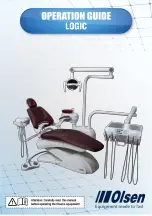
TWIGA CLASSIC S50
7
Safety Recommendations
Beware of the following Potential Dangers associated with the use of this
machine:
•
Becoming trapped when hitching or unhitching
•
Tractor overbalancing when arm is extended
•
Electrocution due to hitting overhead power lines
•
Getting caught on rotating power take off (PTO)
•
Being hit or caught by any moving part, e.g. belts, pulleys, arms, cutting
head
•
Being hit by flying debris or machine parts due to machine damage
•
Machine overbalancing when not in use
•
Injection of high pressure oil from damaged couplings or hydraulic
hoses
•
Accidents due to collision with other machines, or debris left on road
Always
•
Ensure the operator has read this handbook and has been trained to
use the machine.
•
Ensure all cab safety guards are in place and all tractor windows
closed.
•
Before leaving the tractor cab always ensure that the flail head is firmly
on the ground, no weight is on the machine’s hydraulics and the rotor
has stopped spinning.
•
Check that all guards are properly fitted and there are no damaged or
loose parts. Particular attention should be given to the flails to ensure
they are not damaged, cracked or missing.
•
Inspect work area for wire, steel posts, large stones and other
dangerous materials and remove before starting work.
•
Beware of the danger of overhead power cables. The operator must
be aware of the maximum height and reach of the machine when
working under power cables. For more information contact the Health
and Safety Executive or your local power company.
•
Ensure that all warning labels are always visible and that they are not
damaged, defaced or missing.
•
Lower the head to the ground when parking up
•
Fit locking pins to slew and height before transport and before
unhitching when applicable.
•
Wear ear defenders if operating without a quiet cab or with the cab
windows open.
•
Ensure tractor guards are fitted correctly and are undamaged
•
Work at a safe speed, taking into account terrain, passing vehicles and
obstacles
•
Ensure that the tractor meets the minimum weight recommendations of
the machine manufacturer and that ballast is used if necessary
•
Check that machine fittings and couplings are in good condition









































